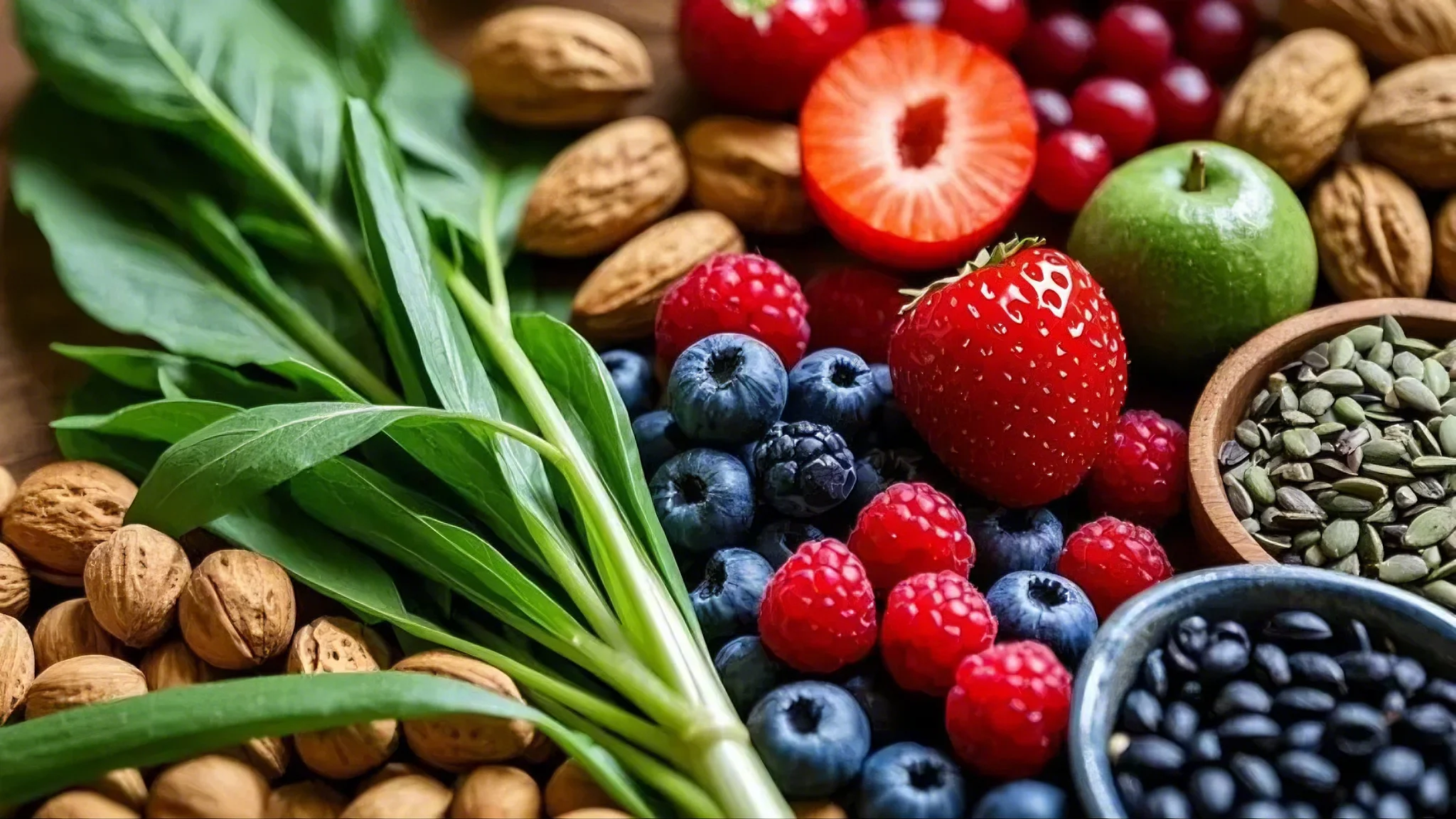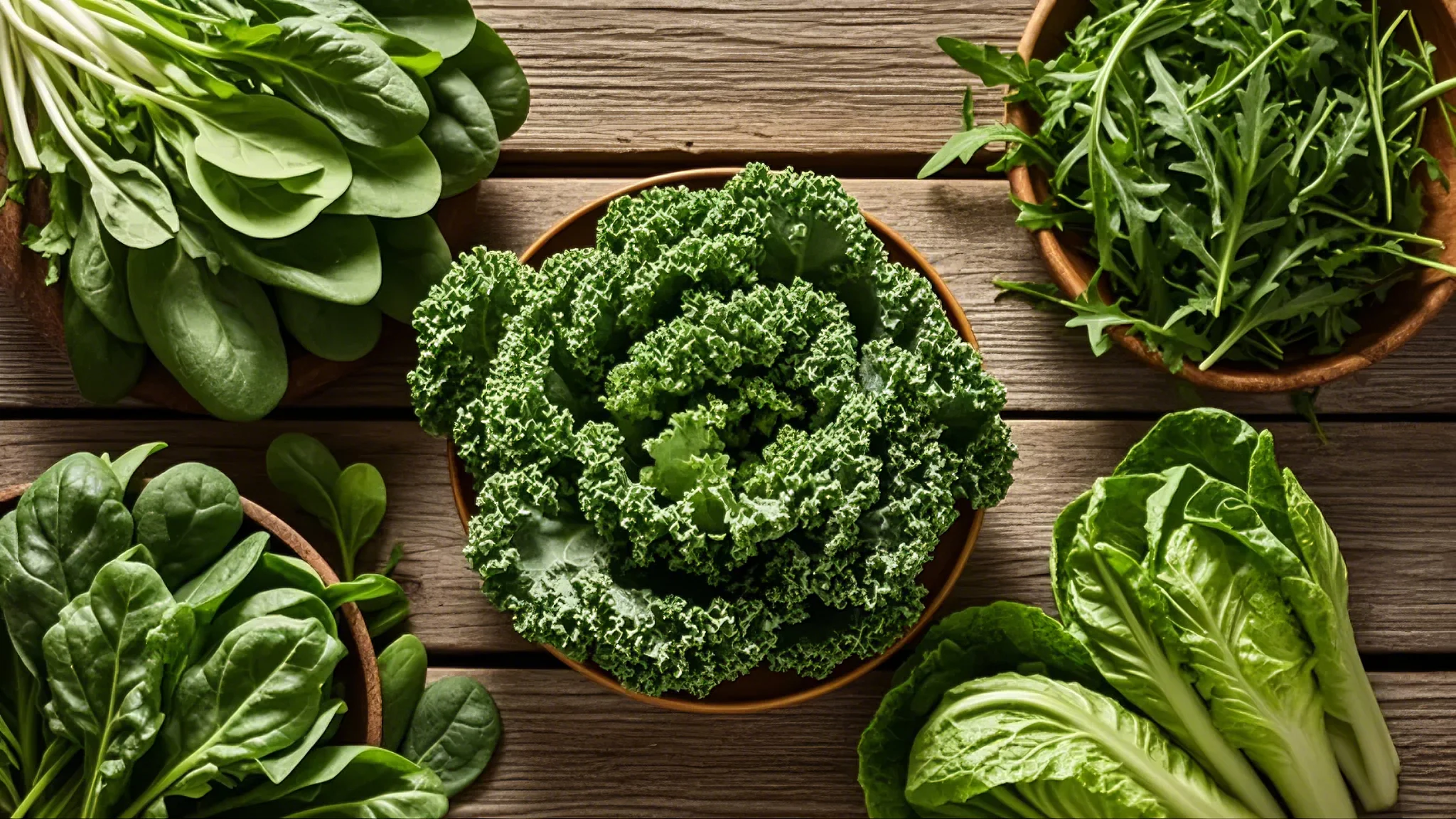Essential Organic Superfoods for a Healthier, Balanced Lifestyle
Have you ever thought about foods that make you healthier? They are often called “superfoods” and they offer many health benefits such as being full of nutrients that help you stay energized and dodge illnesses.
Even though scientists haven’t officially defined superfoods, they mean foods loaded with good stuff. These include vitamins, minerals, antioxidants, and fiber.
Eating these foods can boost our immune system. They also fight inflammation and lower the risk of diseases.
Superfoods range from blueberries and salmon to kale and almonds.

The Concept of Organic Superfoods
The word “superfood” is widely used when we talk about healthy eating.
What exactly does this mean?
Best superfoods are foods filled with vital nutrients and health benefits. These foods are rich in essential vitamins, minerals, and antioxidants. They boost overall health and wellness.
There isn’t a clear scientific definition of “superfood.” Still, foods known as best superfoods are usually great for fighting inflammation and enhancing the immune system. Take berries, for instance. They are loaded with vitamin C, fiber, and potassium. They are excellent for heart health and your overall well-being.
Kale is another top superfood, packed with folate, zinc, calcium, and many other nutrients. Chia seeds stand out too. They offer magnesium, fiber, protein, healthy fats like omega-3s, and vitamins.
However, the EUFIC warns that superfoods’ benefits are mostly studied in limited settings. It’s better to eat a mix of these nutrient-rich foods for the best outcomes. The goal is to enrich your diet with nature’s most potent nutrients.
Eating foods like broccoli or drinking green tea can tremendously benefit your health. They are full of vitamins, minerals, fiber, and antioxidants. The aim of adding best superfoods to your diet is to tap into the power of nature. This can lead to better health and prevention of illnesses through superb nutrition.
The Nutrient-Rich Berries
Berries are nature’s potent organic superfoods. They pack many health benefits into small, colorful packages. These tiny treasures are excellent for energy and skin health due to their high antioxidants and nutrients.
Blueberries
Blueberries are special among berries. A cup (148 grams) gives 84 calories, 3.6 grams of fiber, and lots of vitamins and minerals. These include 16% of Vitamin C, 24% of Vitamin K, and 22% of Manganese daily values.
Rich in anthocyanins, they fight cellular damage and may prevent cancer. Blueberries boost brain function, lower heart disease risk, and improve skin. This makes them great for energy and skin health.
Other Berries
Raspberries are also health-packed. One cup (123 grams) has 64 calories and 8 grams of fiber. It provides 36% of Vitamin C, 8% of Vitamin K, and 36% of Manganese daily values.
Strawberries are nutritional stars too. They give 46 calories and 3 grams of fiber per cup (144 grams). Plus, they offer 94% of the Vitamin C and 24% of the Manganese daily values.
Then, there are goji berries, bilberries, açaí berries, and cranberries. Each has unique nutrients. Goji berries have lots of Vitamin A and iron. Bilberries are antioxidant-rich. All these help with energy and skin health.
They fit well in smoothies, salads, or desserts. This makes it easy to add these nutrient-rich berries to our diet.
Enjoying these berries boosts overall wellness. Their superfood properties help maintain energy and nourish the skin. They’re key for a healthy diet.

Health Benefits of Cruciferous Vegetables
Cruciferous vegetables are key for better health. They support the immune system well. Foods like broccoli, kale, and Brussels sprouts are packed with nutrients.
Types of Cruciferous Vegetables
Common cruciferous vegetables include:
- Broccoli
- Cauliflower
- Brussels sprouts
- Kale
- Chinese cabbage
- Cabbage
They are full of vitamins and minerals, helping us stay healthy. For example, a serving of broccoli has 39 calories, 2.4g of fiber, and 91.3mg of Vitamin C.
Health Impact
Eating cruciferous vegetables can make us healthier. They contain glucosinolates and other helpful phytochemicals. These nutrients help fight cancer and support the immune system.
- Improved heart health
- Enhanced immunity
- Better digestion thanks to fiber
- Helps with weight loss
These vegetables are low in calories but high in nutrients. For example, kale has 4.1g of fiber, 390ug of Vitamin K, and 2,870ug of Beta-carotene per serving. This shows their role in our diet is important.
They can even reduce cancer risk and help detox the body. Adding these veggies to our daily meals is smart. It leads to a healthier life.

The Power of Leafy Greens
Eating leafy greens like spinach, kale, and Swiss chard is smart for healthy living. These foods are packed with nutrients that help you stay fit. They’re organic superfoods for weight loss and improve your health. Let’s dive into what makes them amazing.
Leafy greens have iron, calcium, and vitamins A and C, which are key for brain and bone health. They also have biotics that boost B12 in your gut. This helps balance the good bacteria in your body, something not many diets talk about.
These greens contain chemicals that fight chronic diseases. Juicing them can help you absorb more nutrients. This can fix nutrient shortages and keep your organs running well. Celery juice, for example, fights bad bacteria and supports a healthy lifestyle.
- One cup of raw kale packs 68% of the DV for vitamin K.
- Raw collard greens offer a whopping 131% of the DV for vitamin K per cup.
- Raw beet greens also impress with 127% of the DV for vitamin K per cup.
- Watercress provides 71% of the DV for vitamin K in just one cup.
- Romaine lettuce delivers 23% and 40% of the DV for vitamins A and K, respectively, per cup.
- Endive leaves pack 97% of the DV for vitamin K per cup.
- Bok choy contains 36% of the DV for vitamin C per cup.
- Turnip greens are a nutritional bonanza: 8% DV for calcium, 33% DV for vitamin C, 27% DV for folate, 35% DV for vitamin A, 11% DV for vitamin E, and 115% DV for vitamin K per cup.
Adding different leafy greens to your diet is good for your health. Spinach contains important minerals like iodine and magnesium. These help your body in many ways. By eating more greens, we can be healthier. Let’s eat more greens every day for our well-being.

Importance of Including Fish in Your Diet
We all aim to eat foods that keep us healthy for a long time. Fish is a great choice for our organic superfoods list. Fatty fish, like salmon, mackerel, and sardines, are packed with nutrients that boost our health.
Types of Fish
Fatty fish are full of essential fats and vitamins. Here are some good fish to eat:
- Salmon – Full of omega-3 fatty acids and vitamin D.
- Mackerel – Good for your heart thanks to its healthy fats.
- Sardines – A great source of omega-3s, helping to lower inflammation.
- Trout – High in omega-3 and vitamin B12.
- Tuna – Offers quality protein, but eat in moderation due to mercury.
Health Benefits
Eating fish regularly is very beneficial for our health. Here are some reasons:
- Heart Health – Fish helps lower the risk of heart problems. It’s key for a healthy diet.
- Brain Function – Omega-3s in fish boost brain power and may slow aging effects on the mind.
- Inflammation Reduction – Fish helps with reducing inflammation, which is good for arthritis patients.
- Mood and Depression – It can also lower depression risk. Omega-3s might make antidepressants work better.
- Eye Health – Omega-3s may prevent eye diseases and vision loss as we get older.
- Vitamin D – Fatty fish are great for getting vitamin D, which keeps our bones and immune system strong.
- Pregnancy Nutrition – Eating fish with low mercury is recommended for pregnant and breastfeeding women.
- Asthma Reduction – Kids who eat fish are less likely to get asthma.
- Sleep Quality – Fatty fish might help you sleep better, thanks to vitamin D.
Adding fish to your meals each week is a tasty way to improve your diet. Try dishes like grilled salmon or a fresh tuna salad. This superfood is a smart addition for better health.

The Role of Legumes in a Balanced Diet
Legumes are key for healthy eating habits yet often missed in our diets. Including beans, lentils, and peas in daily meals boosts plant protein and fiber. This helps with overall health and wellness.
Examples of Legumes
Here are some legumes and their nutrition facts:
- Chickpeas (Garbanzo Beans):
– Calories: 269 per cup
– Protein: 14.5 grams
– Fiber: 12.5 grams
– Folate: 71% of the Daily Value (DV) - Lentils:
– Calories: 230 per cup
– Protein: 17.9 grams
– Fiber: 15.6 grams
– Folate: 90% of the DV - Peas:
– Calories: 134 per cup
– Protein: 8.58 grams
– Fiber: 8.8 grams
– Thiamine: 35% of the DV - Kidney Beans:
– Calories: 225 per cup
– Protein: 15.3 grams
– Fiber: 13.1 grams
– Folate: 58% of the DV - Black Beans:
– Calories: 227 per cup
– Protein: 15.2 grams
– Fiber: 15 grams
– Folate: 64% of the DV - Soybeans:
– Calories: 296 per cup
– Protein: 31.3 grams
– Fiber: 10.3 grams
– Iron: 49% of the DV - Pinto Beans:
– Calories: 245 per cup
– Protein: 15.4 grams
– Fiber: 15.4 grams
– Folate: 23% of the DV
Health Benefits
Legumes bring many health benefits that improve our eating habits:
- Heart Health: Eating legumes for three weeks can lower cholesterol for better heart health.
- Blood Pressure: Regular legume consumption can reduce blood pressure, aiding heart health.
- Diabetes Management: A diet low in glycemic index with legumes helps those with type 2 diabetes.
- Weight Management: People eating legumes tend to have lower body weights, showing the benefits of these foods.
- Digestive Health: Legumes’ high fiber content helps prevent constipation and supports a healthy gut biome.
About 8% of U.S. adults eat legumes daily. Including these in our meals makes a big step towards better health.

Incorporating Nuts into Your Meals
Nuts make our meals tasty and healthy. They’re full of good fats, proteins, and antioxidants. Almonds, walnuts, and pecans are not only delicious. They bring important nutrients that boost our health.
Walnuts, for example, are rich in omega-3 fats, which are good for the heart. Eating a small handful of nuts or two tablespoons of nut butter several times a week is a good idea. This habit can lower bad cholesterol and fight inflammation linked to heart disease and diabetes.
Nuts are great for keeping our energy up, too. Their protein and fiber help us stay full, which is great for managing weight. Studies show that almonds can help overweight women lose weight three times faster. Plus, eating tree nuts daily decreases the risk of metabolic syndrome in young adults.
Eating nuts often has many health perks. People who consume nuts seven times a week tend to live longer. Just half a cup of walnuts daily can cut down bad cholesterol and enhance heart health. Nuts also boost brain function and memory. Those eating nuts every day saw a 16% improvement in memory tasks.
It’s easy to see that nuts are super beneficial for our health. Sprinkle them on your salad, blend them into smoothies, or snack on them. Making nuts part of our daily food can lead us to a healthier and more energetic life!
The Versatility of Yogurt in a Superfood Diet
Yogurt is an organic superfood that is important for our health. It is full of probiotics, which help our gut health. It also gives us many nutrients that improve our health overall.
The Nutritional Content
One cup of yogurt can give you 49% of your daily calcium need. It has B vitamins like B12 and riboflavin, which are good for your heart and prevent certain birth defects. This cup also has phosphorus, magnesium, and potassium which help with blood pressure and bone strength.
If you’re looking for more protein, Greek yogurt is a great choice. Just 7 ounces has 20 grams of protein. This helps with metabolism and keeps your appetite in check.
Just be sure to check the labels for unhealthy additives like sugar.
Health Benefits
Yogurt is great for the immune system. Its probiotics reduce symptoms of irritable bowel syndrome and protect against diarrhea from antibiotics. Eating yogurt often might even make you less likely to catch a cold. It can also help your heart by raising good cholesterol levels and lowering blood pressure.
Greek yogurt’s protein makes you feel full, which can help with weight control. Yet, people with lactose intolerance should be careful with yogurt. Some may handle it well because of how it’s made and its probiotics. Those allergic to milk need to avoid yogurt because it has proteins that could cause severe reactions.
Sources
- American Heart Association
- Mayo Clinic – Nutrition and Healthy Eating
- Academy of Nutrition and Dietetics – Eat Right
- Healthline – Superfoods Overview
